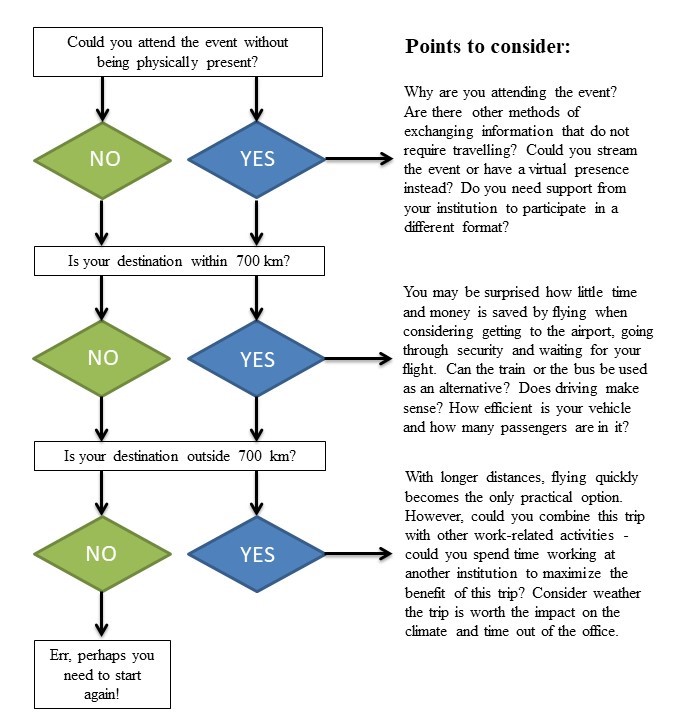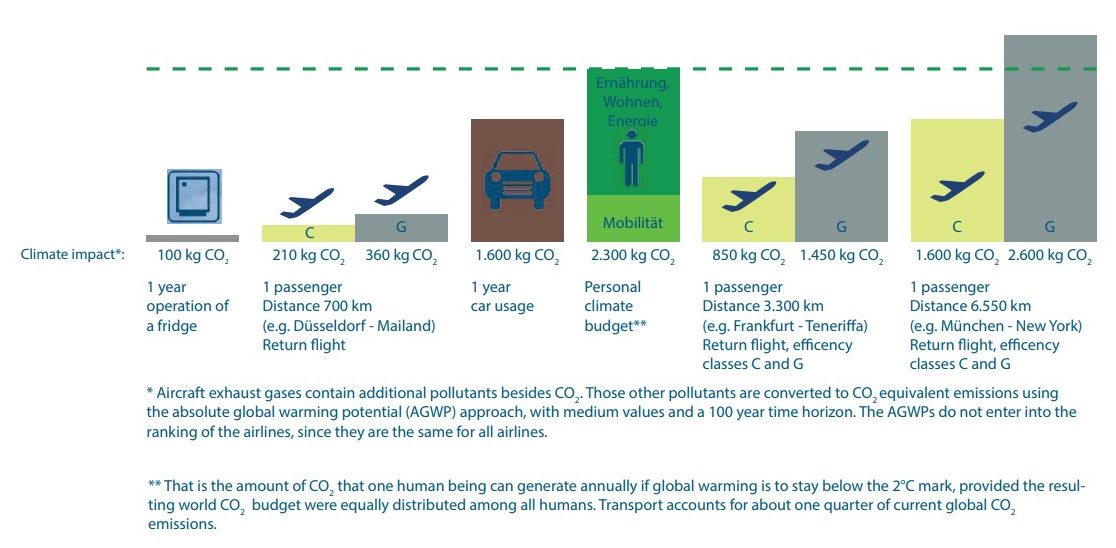Carleton Travel Strategy Proposal
(June 2017 version)
Carleton Climate Commons Working Group[*]
Foreword: Limiting climate change requires substantial and sustained reductions of greenhouse gas emissions. Carleton University acknowledges its share of global emissions, particularly from emissions related to flying to conferences and meetings (one international flight is equivalent to a typical person’s annual carbon emissions from all other sources). While travelling helps advance research, options are available to limit travel emissions by reducing the distance travelled, switching travel modes, and using alternative modes of communications. The Strategy under development aims to help individual researchers and Carleton as a whole to reduce its emissions over time.
This page aims to provide a strategic frame for reducing the travel emissions of researchers at Carleton. It includes (I) some General Principles (II) a Code of Conduct to support a change of mentality around research travelling, (III) a ‘Decision tree’ to help make decisions at the moment of travel, and (IV) a way to justify your travel emissions by ranking different types of travel.
- I - General Principles
-
Our travel strategy should be simple, self-guided, open and transparent, and driven by an overall goal.
Simple: there is enough administrative burden associated with travel. Our researchers want a simple system that provides them with feedback on their performance compared to their previous practice (through time) and to others.
Self-guided: there is such a diversity of researchers with different views on the usefulness of travel for research that we ask our researchers to evaluate for themselves the rationale for their travel emissions. We provide a ranking table with the general principles. Interested researchers can sign up to the strategy (it is not compulsory).
Assisted self-monitored: we would like to offer a way to report your travel emissions for Carleton-related work and research. One strategy being explored is to have the My Travel system provide users and administration with a yearly travel emissions report. Another one would be to find a way for Conferences organized at Carleton to easily come up with a travel emissions report. We recognize that not all trips are equal. See Table 1: how to justify your travel emissions.
Open and transparent: we want the public to know that we are taking our emissions seriously and acting to reduce them. For this, we would like Carleton to make public our emissions when the system is established.
Driven by an overall goal: we acknowledge the benefits of travelling for research, and the necessity to scale up the effort for emissions reductions throughout the entire community. We are working to develop alternatives to travelling by: (1) identifying alternatives to travelling with modern modes of communication; (2) making efforts ourselves to develop and use the web-based research space.
The fundamental basis for the Carleton travel strategy should be grounded on the Canadian government’s target of reducing emissions by at least 80% from 1990 levels by 2050, as stated in the December 2015 Paris Agreement, signed by the Canadian Government.
Scope: This strategy refers to travel emissions undertaken for work activities only. It does not include personal travel or commuting to work.
- II – Code of Conduct to support a low-carbon research culture
-
- Monitor and reduce. I will keep track of the carbon emissions of my professional activities, and set personal objectives to reduce them in line with or larger than my country’s carbon emissions commitments (see Section III).
- Account and justify. I will justify my travel considering the location and purpose of the event, my level of seniority, and the alternative options available.
- Prioritize, prepare and replace. For activities that I organize, I will choose the location giving high priority to a low carbon footprint of travel of the participants, and I will encourage, incorporate and technically support online speakers and webcasts to reduce unnecessary travel.
- Encourage and stimulate. I will resist my own FoMo (Fear of Missing Out) from not attending everything and work towards sensitizing others to the need of the research community to walk the talk on climate change.
- I will work with my peers, my University and Funders to value alternative metrics of success and encourage the promotion of low-carbon research as a realizable alternative to a high-carbon research career.
- III – Decision tree
-
The decision tree aims to help you identify low-carbon travel alternatives, and help you maximize the benefits of your travel emissions.

- IV – How to Justify Your Travel Emissions
Table 1: Ranking different types of travel
We refer to research stages as follows: Stage 1: Early Stage Researchers (for example, up to 2 years after PhD); Stage 2: Intermediate Stage Researchers (for example, up to about 10 years after PhD); Stage 3: Established Researchers (for example, in permanent positions with over 10 years since PhD).
| Weight |
Justification |
| 1 |
Well justified emissions, for example: Conduct field work. Travelling to meet contractual engagement (e.g. from research grants), with no alternative options available. Risk of job loss with refusal to travel.
And for Stage 1: Present and promote own research. Establish contacts. Attend and present work at project meetings. |
| 2 |
Useful but with potential for using alternative options.
Stage 1: Attend a workshop not directly related to own research. Stage 2: Travel to present own work and promote own research.Stage 3: Travel to explore new topics. Could lead to important research or funding for own or group/institute research. Travel acts to move projects or significant collaborations forward. |
| 3 |
Less well justified with much potential for using alternative options. Good value mainly for low-emissions travel.
Stage 3: Travel to present own work and promote own research. Travel to establish or maintain own collaborations. Invited guest lectures. |
| 4 |
Poorly justified emissions. Good value only for low-emissions travel.
Travel to keep up to date or renew connections with colleagues. No results presented. Little pre-travel arrangements made to optimize the usefulness of the meeting. |
This strategy has been adapted from the Tyndall Centre Travel Strategy.
John Vidal discusses other strategies to limit flying and changing attitudes towards travel in “Why I only take one holiday flight a year”, while Sara Peach gives advice for those feeling guilt about flying by focusing on legislative alternatives in “I feel guilty about flying, but I have a sick relative and a wedding coming up. Help!”.
If you really need to fly…
- Choose a direct flight.
- Check the efficiency of the Airline here.

Taken from the 2018 atmosfair Airline Index.
[*] The Climate Commons is working on having Carleton adopt this proposal (Spring 2017). In the meantime, the information is here for people to consult. Air travel is not yet taken into consideration in the April 2013 in the Facilities Management and Planning strategic plan: A strategic Plan for Embedding Sustainability in Carleton University Operations: https://carleton.ca/fmp/wp-content/uploads/Sustainability_Strategic_Plan_-_Updated_May_2013.pdf, although there is a commitment there to: “Develop a Climate Action Plan by June 2015 with clear, real targets for reduction. Climate change is arguably one of the largest global threats to the environment and humankind. While planning for energy conservation and establishing other general sustainability targets, a comprehensive carbon reduction plan should be created.”
The Carleton sustainability website (https://carleton.ca/fmp/energy-and-sustainability/sustainability-strategic-plan/ ) also indicates that “In 2014 Carleton used a total of 88,748 MWh and reduced consumption by 2,294 MWh (2.6%) through program initiatives.” While this suggests that Carleton is actually tracking total energy use (and thus greenhouse gas emissions) across Carleton as a whole, it remains unclear if all travel and air travel are included. In fact, air travel may be increasing, thus negating the reductions.
Share: Twitter, Facebook
Short URL:
https://carleton.ca/climatecommons/?p=664


